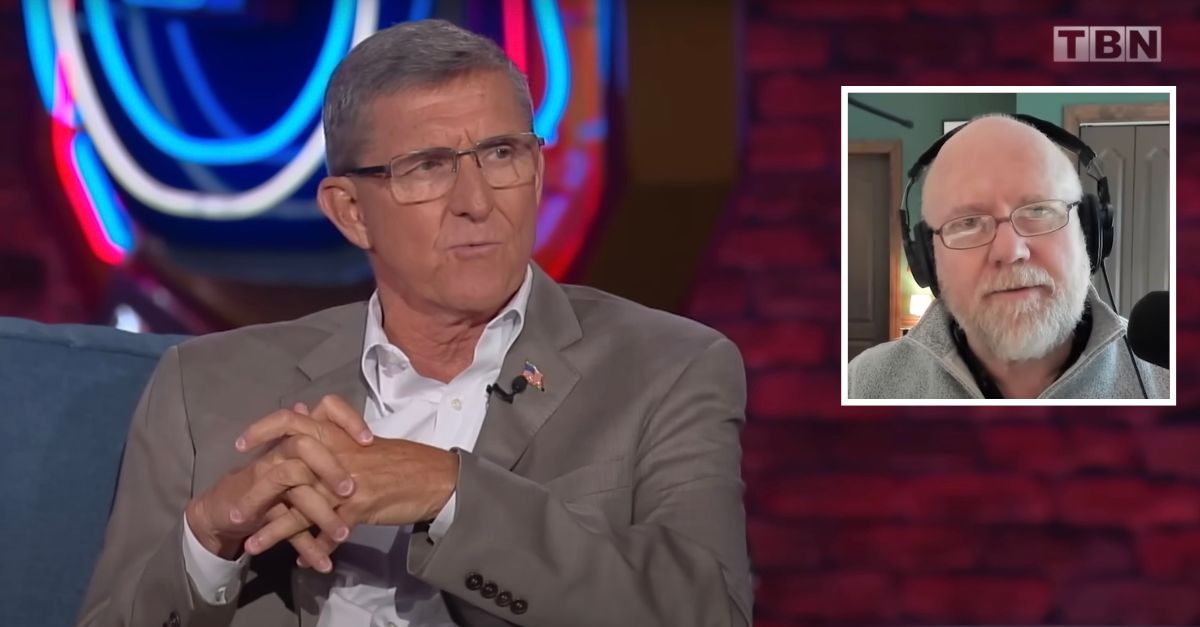
Main: Michael Flynn appearing on the Huckabee Today in September 2024 (TBN). Inset: Rick Wilson (Lincoln Project/YouTube).
Michael Flynn is asking the Florida Supreme Court to review a defamation lawsuit he brought against political strategist and Lincoln Project founder Rick Wilson, who accused the former national security adviser to Donald Trump of being a “Putin employee” as well as the leader of the conspiratorial QAnon movement.
Flynn initiated the appeal Wednesday by filing a notice with the state’s high court after the dismissal of his case was affirmed by an appellate court last month. The trial court and three-judge panel on the Second District Court of Appeals both reasoned that Wilson’s statements were protected by the First Amendment. Flynn’s motion for the case to be reheard by the full slate of judges on the appeals court was denied.
At the initial stage of the filing, Flynn is not required to present his arguments to the Sunshine State’s highest court.
As Law&Crime previously reported, the crux of Flynn’s complaint involved two tweets from Wilson, one of which referred to the retired general as “Putin employee Mike Flynn,” and another in which Wilson retweeted a post that stated “FYI, Mike Flynn is Q.” The latter post was referring to Flynn being the “purported government insider with a high-level security clearance who began posting cryptic messages in 2017 about the deep state trying to destroy the president.”
Flynn’s suit sought $50 million in damages as well as a permanent injunction barring Wilson from continuing to defame him.
Describing Flynn as a “quintessential public figure” for the purposes of defamation, the appeals court agreed with Wilson in finding that his statements were protected opinions or rhetorical hyperbole that lacked the “actual malice” required to succeed on a defamation claim.
Regarding the “Putin employee” tweet, the court refused to isolate the word “employee” from the larger context of the tweet, which Wilson posted in direct response to a letter Flynn penned after Russia invaded Ukraine.
“Wilson’s statement may indeed appear to be making a factual claim about Flynn’s economic relationship with Putin. But that is not what a reasonable reader of Wilson’s Twitter feed would think Wilson was trying to communicate,” the court wrote. “Rather, whether Flynn gets a regular paycheck from the Russian Federation — like Putin’s secretary perhaps — just isn’t Wilson’s point. A reasonable reader of Wilson’s response to Flynn’s letter would instead understand Wilson to be expressing essentially the same thing he wrote in his book, namely, what else would you expect from someone ‘in bed with the Russians’?”
The panel further found that Wilson was “simply reacting imaginatively” to Flynn’s letter and that people who saw the tweet would have had access to “widely publicized news stories about Flynn’s purported connections with Russia.”
As for the “Flynn is Q” tweet, the appeals court said “no reasonable jury” could find that the remark defamed Flynn, noting that he “failed in the first instance to demonstrate that the statement was even capable of being proven true or false.”
Describing Flynn’s relationship with the QAnon movement as “complicated,” the decision pointed out that Flynn had publicly denounced QAnon as a “terrorist organization” while simultaneously authorizing the sale of Flynn-themed merchandise “affixed with highly specific slogans commonly associated with QAnon, such as WWG1WGA.”
The panel also emphasized that Flynn, who has the burden of showing Wilson’s comments were false, never provided the court with a sworn statement clarifying that he is not a leader of QAnon.
“Although the record persuades us that most QAnon adherents believe that there is at least one Q (and maybe more), we cannot discern much else about that person or persons, whether inadvertently or by design,” the decision states. “Nevertheless, this ambiguity does not create a genuine issue of material fact for the jury to resolve. If Flynn is not Q (or one of the Qs), then it presumably would not have been hard for him to have filed an affidavit with the trial court to that effect.”
The court went on to call the “Q” tweet an example of generally “nonactionable name calling” without any “verifiable core.”
In closing, the appellate panel lauded the U.S. as a country with a profound commitment to the principle that “debate on public issues should be uninhibited” and that such debate “may well include vehement, caustic, and sometimes unpleasantly sharp attacks.”
“Like it or not, such attacks are a characteristic feature of our democracy — regardless of the political persuasion of the speaker and regardless of the political persuasion of the public figure on the receiving end of that speech,” the ruling states. “As the trial court noted, Wilson’s tweets may not have been polite, and they may not have been fair. But the First Amendment required neither, and so we affirm.”







